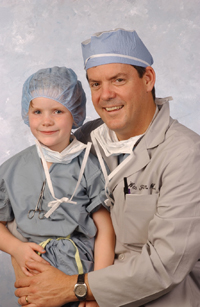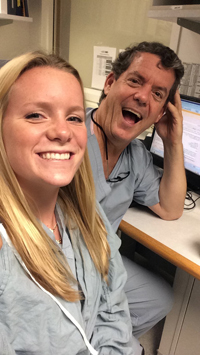August 12th, 2014
From the Mouths of Babes
Shengshou Hu, M.D.
CardioExchange welcomes this guest post from Dr. Westby Fisher, an electrophysiologist practicing at NorthShore University HealthSystem in Evanston, Illinois, and a Clinical Associate Professor of Medicine at the University of Chicago’s Pritzker School of Medicine. This piece originally appeared on his blog, Dr. Wes.
“Dad, you have the nicest patients!”
She was right, of course. Daughters that you bring to work with you to shadow for a day can bring you back to what’s important in medicine. In fact, seeing medicine through fresh eyes is helpful, especially when we forget to look up from our work-a-day lives.
 It had been over ten years since I had my first “Bring Your Daugher to Work” experience. Her first time she wore scrubs they were bigger than she was. She always remembered that day.
It had been over ten years since I had my first “Bring Your Daugher to Work” experience. Her first time she wore scrubs they were bigger than she was. She always remembered that day.
There probably won’t be too many more times we’ll share such an experience together. Like most young college kids she’s growing her own life now, trying to decide what to do.
“Why not shadow me and my nurse practitioner for a day to see what you think? I have a light day, you could really see what we do first-hand!”
Much to my surprise, she agreed. And so we spent the entire day together once more.
She saw everything I did but this time with a more critical eye. She saw everything my nurse practitioner did, too. Just in case. She witnessed the miracle of anesthesia, a strangeness of the “time-out,” then the jolt of a cardioversion. She saw the smile of the patient after it was all over. She saw the real discourse that occurs between colleagues that are used to working with each other. She saw the computer. She saw the EKG. She saw the family discussion afterward. Everything.
Perhaps most touching was the moment we walked into a long-time patient’s room — a fellow doctor — and there he was, lying in bed with his ankles too swollen, with his wife, daughter, and granddaughters by his side. His eyes, while a bit sunken, were beaming when he saw me.
“I’d like to introduce you you my family!” he exclaimed. And one by one he introduced me to his lovely wife, daughter, and granddaughters who had all come to spend some time with him. Of course, I couldn’t resist, and similarly gushed, “I’d like to introduce you to a member of my family, too!” I proudly introduced my daughter to him and the rest of his extended family. His grandaughters were slightly younger than my daughter — just starting to think about college. My daughter, now a veteran of the college experience, offered some words of encouragement to them. They graciously nodded. I couldn’t help but marvel how therapeutic that interaction was for both of us — doctor and patient — a way to bring our lives a bit closer, our understanding more meaningful. Medicine is like that sometimes: one minute you’re there to help the patient then you realize how much, in their grace, they help you.
I pretended not to think about this as I checked his defibrillator. “Working fine,” I told him. He glanced at me and said “thank you” in a way I’ll never forget: nonverbally with his eyes, as if to say, “I know how you’re feeling.”
We left the room and returned to the nurse’s station — or maybe it should be called the “Computer Terminal Station,” since doctors, pharmacists, and physical therapists were all playing a game of musical chairs waiting for a terminal to open. More typing and staring at screens, more phone messages, documentation, lab checks, more typing, all clicked as fast as possible. Finally, after seeing more patients and typing more notes, we had a debriefing. Relaxed and looking forward to heading home, I asked her: “So what did you think?”
“You know, Dad, it was wonderful. Your patients are all so nice. But…”
There was a moment of hesitation in her voice, a concern, as she wrestled with how to break the news to me slowly; I could tell she didn’t want to disappoint me.
“What is it?” I asked.
“… there’s just so much typing!”


So much clicking and typing drags down many of us!